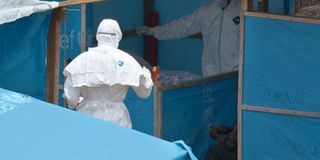Engage tribal chiefs in tackling Liberia Ebola crisis

Workers in Personal Protection Equipment suits (PPE) inside the high-risk quarantined zone of the John Fitzgerald Kennedy hospital in the Liberian capital Monrovia on September 5, 2014. PHOTO | DOMINIQUE FAGET |
What you need to know:
- In Liberia, people are starving. Due to the state of emergency, the government has closed down major street markets, creating food and drug shortages.
- In the face of the current outbreak, which is anticipated to infect at least 20,000 West African lives, the response team must collaborate with tribal leaders.
By now, you know the facts. More than 1,900 people have died of Ebola. Liberia, Nigeria, Sierra Leone and Guinea have each declared a state of emergency.
In Liberia, the entire nation is under a strict curfew from 9pm to 6am.
And, although Guinea acknowledged the Ebola outbreak in March, the international community has ramped up its response with greater provision of financial, medical and human resources only recently.
Here is what you might not know. In Liberia, people are starving. Due to the state of emergency, the government has closed down major street markets, creating food and drug shortages.
According to Mr James Logan, a tribal leader from Banjor, Liberia, the price of a 23-kilogramme bag of rice has risen from 2,450 Liberia dollars ($29) to 3,000 Liberia dollars ($36).
Considering that 76 per cent of the population lives on less than $1 per day, that is a substantial increase.
What’s more, bodies infected with the virus are left to deteriorate on the streets for days, sometimes weeks.
Three weeks ago, armed men in the country’s largest slum, West Point, raided a makeshift Ebola treatment centre.
And two weeks ago, they attacked Liberian soldiers, prompting them to fire live rounds of ammunition.
Ebola is spreading at an unprecedented rate, and the response team needs a new approach.
Last summer, I spent three months conducting research in three of Monrovia’s fishing communities, one of which was West Point.
Since it is well-known for violence, expatriates are told to avoid the area. As a result, I had to confront the same distrust and suspicion that is evident in the response to today’s medical experts.
The first time I entered West Point, I was with two government officials from the Bureau of National Fisheries.
Few seemed to trust us. Some questioned our intentions, others stopped and watched inquisitively.
I knew my affiliation with government officials was adding to the suspicion, but I also knew whom to befriend: the tribal chief.
EAGER TO COLLABORATE
On that visit, I became a friend of the Kru tribe’s chief, Amos. When Amos addressed the community and described my research, the residents welcomed me and offered to help. They understood my intentions, and were eager to collaborate. Without Amos, I never would have been able to conduct my research.
In the field experiment’s follow-up survey, 90 fishermen from West Point, Point Four and Banjor were asked: “If there was a problem in the community, who would you ask to help fix it?”
Eighty-five said the chief of their tribe. Those numbers cannot be ignored, and they make sense when one considers Liberia’s political history.
After declaring independence in 1847, the Liberia government monopolised power and focused its resources on Greater Monrovia.
For more than a century, the Americo-Liberian ethnic group’s True Whig Party dominated the central government.
Since most of their patron-clients lived in Greater Monrovia, they chose to rule through tribal chiefs in the hinterland.
This system existed from the end of the 19th century until 1980, when a coup created instability and led to a 14-year civil war.
HISTORICAL CONTEXT
Understanding this historical context is important when devising a response to the current Ebola outbreak. In most parts of the country, the most trusted authorities are the tribal chiefs.
Even in Monrovia, certain areas such as West Point feel alienated by the government and hold a greater respect for their tribal leaders.
In the face of the current outbreak, which is anticipated to infect at least 20,000 West African lives, the response team must collaborate with tribal leaders.
These leaders have developed rock-solid trust networks around the country, and if international experts work with them, armed men attacking medical workers and soldiers will turn into a welcoming network of collaborators.
It is simple. Tribal leaders will ensure cooperation and give medical experts the access they need to control the spread of the virus.
Today, Mr Logan sent me a text message. “People are dying from hunger, heartbreak, and stress. Ebola is taking the lives of people who haven’t even been infected.”
At the end of his message was a simple question we have all been asked 1,000 times. Rarely has it ever been so important.
“What will you do?”




